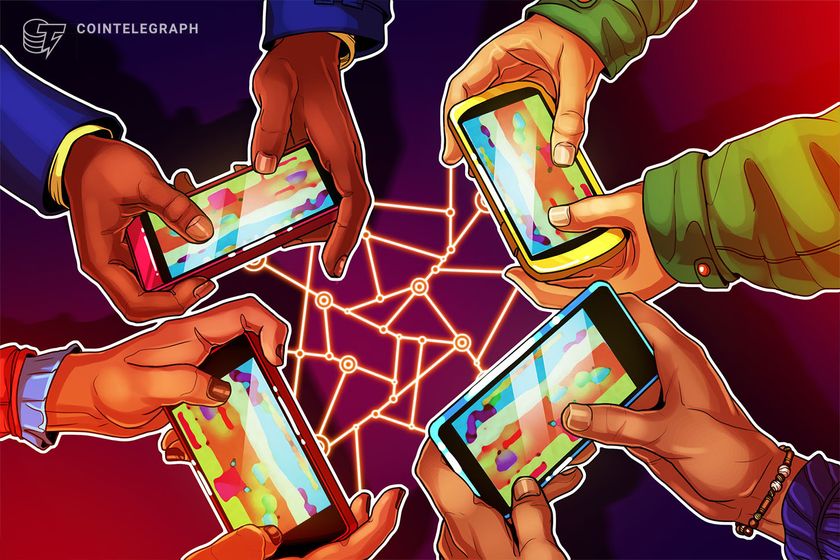 While the traditional gaming industry’s free-to-play model is largely credited for its past and projected success, on the downside this model only prioritizes building games that “optimize for addiction and profit maximisation” rather than “innovative entertainment,” Weiwei Geng, the CEO of Taki Games, has argued. The Blockchain Can Revolutionize the Gaming Landscape According to Geng, […]
While the traditional gaming industry’s free-to-play model is largely credited for its past and projected success, on the downside this model only prioritizes building games that “optimize for addiction and profit maximisation” rather than “innovative entertainment,” Weiwei Geng, the CEO of Taki Games, has argued. The Blockchain Can Revolutionize the Gaming Landscape According to Geng, […] The recent adoption of cryptocurrency by traditional financial (tradfi) institutions is likely to reshape user perceptions of this asset class and may even foster broader acceptance of blockchain technology, Sami Start, co-founder and CEO of the crypto trading platform Transak, has argued. Start added that the entrance of tradfi institutions into this market is likely […]
The recent adoption of cryptocurrency by traditional financial (tradfi) institutions is likely to reshape user perceptions of this asset class and may even foster broader acceptance of blockchain technology, Sami Start, co-founder and CEO of the crypto trading platform Transak, has argued. Start added that the entrance of tradfi institutions into this market is likely […]

Gaming studio founders Yat Siu and Johnson Yeh think more people are coming to Web3 next year — and blockchain games are why.
Crypto market hype and the “commercial release” of several highly anticipated blockchain games will likely onboard “tens of millions” gamers to Web3 in 2024, according to Web3 gaming execs.
“2024 is a growth year in terms of bringing people on to Web3,” said Yat Siu, co-founder of gaming and venture firm Animoca Brands, in an interview with Cointelegraph.
In the last three months, around 1 million — or more — unique active wallets have played Web3 games daily, according to DappRadar data. However, Siu believes there could be up to 100 million more next year.

Polemos co-founder Richard McLaren believes the future of blockchain gaming will involve gamers and developers renting out their in-game NFTs for profit.
Imagine a future where a player is able to rent an in-game item via blockchain, giving them tools to pass a difficult level, or borrow an NFT that gives them the ability to try a new game on their wishlist.
Such a feature is one that Polemos co-founder Richard McLaren is hoping will one day become the norm, along with an economy where players rent out their in-game assets for a fee.
In an interview with Cointelegraph, McLaren announced a new partnership between his gaming infrastructure service Polemos and fantasy battle game Illuvium, a move he said would help break down barriers for players looking to get started on Illivium’s platform.

More than a third of survey respondents believed the blockchain gaming industry benefited most from traditional game studios adopting Web3 tech in 2023.
Nearly 40% of blockchain game developers believe that traditional gaming studios will be one of the biggest positive driving forces for the Web3 gaming sector in 2024.
In its “2023 State of the Industry Report,” released on Dec. 12, the Blockchain Gaming Alliance (BGA) found that 37.8% of respondents believed Web2 studios launching new games in Web3 or applying blockchain elements to existing titles would help push the industry forward in 2024.
When asked to identify the biggest positive driver in 2023, 19.8% of respondents cited traditional game studios launching nonfungible token games, while 15.2% pointed to the same studios transitioning into Web3.

G2A Capital Group CEO Bartosz Skwarczek said that the marketplace will help gamers find information on Web3 games and buy and sell assets associated with the games.
Digital game vendor G2A has recently launched a marketplace for nonfungible tokens (NFTs) linked to Web3 games to expand its offerings by adding gaming NFTs to its wider collection of gaming software.
According to a press release sent to Cointelegraph, the new venture launched on Nov. 15 is aimed at giving exposure to Web3 and NFT games that the G2A team has curated. With this, gamers will have the chance to see what blockchain gaming offers and be shown NFTs from games partnered with G2A.
At @G2A_Geekverse we believe that Web3 gaming is not just a buzzword.
— G2A Geekverse (@G2A_Geekverse) November 11, 2023
It represents a paradigm shift toward decentralization, digital ownership, and a new era of gaming experiences, empowering players and taking digital ownership to the next level.
Evolution has begun. pic.twitter.com/R61fJ1K1EZ
Bartosz Skwarczek, the CEO of the G2A Capital Group, said in a statement that the company has been following the development of the blockchain gaming sector since the advent of NFT gaming project Cryptokitties. As it watched, it discovered that gamers already engage with the sector despite some believing gamers hate crypto. He explained:
“It turned out that players are quite familiar with the blockchain gaming industry, and a significant portion of them already play Web3 games and have even engaged in NFT trading from games.”
Because of this, the game vendor launched G2A Geekverse to provide an online space for fans of Web3 games. Skwarczek added that within this space, gamers will “find information about the best Web3 games” and “have the opportunity to buy and sell digital assets associated with these games.”
Related: Roblox CEO 'dreams' of in-game cross-platform NFTs and digital objects
Traditional gaming distributors have been warming up to Web3 gaming since 2023. In July, the Google Play Store started to accept NFT games with certain restrictions. According to its team, they will allow games that offer NFTs for sale or to earn. However, the app distributor has clarified that they will not allow gambling with NFTs within their platform.
Apart from Google Play, video game developer and publisher Epic Games has shown openness regarding Web3 gaming. On June 22, the Epic Games Store listed Gods Unchained, an NFT collectible trading card game with comparable gameplay to popular titles like Magic: The Gathering and Hearthstone. The game store is also on track to list another blockchain-based game called Illuvium on its game marketplace on Nov. 28.
Magazine: ‘$10K JPGs’ scare away gamers, Animoca’s crypto game streaming plans: Web3 Gamer

"I was gobsmacked" — Nolan Bushnell said his conversation with Yat Siu on Web3 games changed his brain.
Nolan Bushnell, the founder of Atari and inventor of Pong — one of the first commercially successful video games — has shared optimism for the future of Web3 games, particularly as it comes to bringing ownership to virtual worlds.
During the Digital Entertainment Leadership Forum in Hong Kong on Aug. 25, Bushnell spoke alongside Animoca Brands co-founder Yat Siu, discussing the past, present and future of gaming. It was moderated by Sean Hung, the managing partner of Chiron Group.
Bushnell, who Yat Siu acknowledged as the “grandfather of gaming” — praised Web3 games for their ability to extend the concept of ownership into the digital landscape.
“Games will increasingly imitate all factors of life. Web3 with blockchain suddenly transmits ownership into the virtual world.”
The Atari founder currently serves as the Chief Knowledge Officer at Web3 gaming company Moxy — and kicked off the panel by sharing the topline details of a conversation he’d had with Siu in the days prior:
“I was just gobsmacked. I mean, we had you know, every once in a while you can have a conversation that changes your brain. We had one of those.”
I'm excited to be speaking at the DELF event. We've chosen Hong Kong for https://t.co/GNemkV0YDf's entrance to the Asian Market https://t.co/phUuANd9LB
— Nolan K Bushnell (@NolanBushnell) August 15, 2023
While Bushnell launched into his prediction of a world in the not too distant future, where the inside of self-driving cars could become a mobile gaming studio, Siu pointed to the potential of Web3 games to help economically monetize gameplay, as games become a more ubiquitous part of everyday life.
“The impact that Web3 gaming has already had…is that you can start earning money with the engagement of the time that you spend in these games.”
Siu said that despite games originally taking the form of “player versus environment” systems, where gamers play against the non-player characters (NPCs), the world of gaming — as seen through the rise of Minecraft and Roblox — has evolved to become a multiplayer ecosystem.
“You don't go to Fortnite to play against yourself or an environment. You go online to play against others, meaning that we, the players, are the content, but the difference is that we haven't really been compensated for it,” Siu explained.
When asked what he saw as the biggest promise provided by Web3 games, Bushnell said that the combination of “KYC and the immutability of blockchain” were the best ways to ensure that players in online games were not bots or bad actors.
Additionally, Bushnell predicted that games would soon become an essential part of the classroom, with students learning best by way of “story and simulation.”
Related: Play-to-earn has fatal flaws: How can Web3 gaming be more sustainable?
While the positives of Web3 games were readily espoused, Yat Siu noted some of the issues that had arisen alongside the proliferation of blockchain gaming.
“When you introduce Web3 and blockchain to any system, including games, you're introducing capitalism. And so the problems we have seen in the last 12 to 18 months comes from the fact that these games have become not just capitalist to the studio that produced it, but to every participant,” Siu said.
Despite the many flaws introduced by the financialization of games — many of which became readily apparent in the “toxicity” of play-to-earn games like Axie Infinity — Siu said that the inherently capitalist element would aid young gamers in gaining a financial education.
“If the world becomes more financially literate because of Web3 gaming — because they understand something about value — then I think the world will become safer.”
Magazine: Blockchain games aren’t really decentralized… but that’s about to change

Launched in October, Sui 8192 is a fully-on-chain tile-sliding puzzle game that records each move as a transaction on the Sui Network.
A simple blockchain game has been behind a massive spike in daily transactions on the Sui Network, with one data platform even suggesting it has surpassed Solana in network activity.
Similar to the 2014 viral browser-based puzzle game 2048, Sui 8192 is a sliding tile game where the players use their arrow keys to shift and combine tiles until they reach a tile worth 8192. It was first launched in October 2022.
Each instance of the game mints a new object, similar to minting an NFT, and each move in the game is recorded as a transaction and thus requires a gas fee payment, according to a July 10 blog post from the Sui Foundation.
Haha! Finallyyyy!!!! #sui 8192 @EthosWalletXYZ I got it. pic.twitter.com/xzau7SO0Fv
— hagoyyds.bnb (@hagoyyds) July 16, 2023
The game was built by Sui wallet provider Ethos Wallet as the first wholly on-chain Sui game. It is open-sourced and was intended to serve as an example of how apps could evolve on the Sui blockchain.
A recent Twitter post from on-chain analytics provider Artemis even suggests the game has helped the Sui Network to surpass Solana in daily transactions.
Artemis data shows Sui Network’s transaction count recently surpassed 20 million, exceeding Solana’s 16 million daily transactions — though it admitted it used a different methodology to calculate daily transactions for the Sui Network.
This is because Artemis counts transaction blocks for Sui instead of transactions when comparing with Ethereum and other chains, it said.
Getting a lot of questions on the @SuiNetwork transaction spike
— Artemis (@Artemis__xyz) July 16, 2023
tl;dr: it's real pic.twitter.com/BsLqaVbnfU
Meanwhile, an initiative called Bullshark Quests by Mysten Labs has also been seen as driving momentum on Sui. For the next few weeks, Bullshark holders can compete for rewards based on their engagement with various Sui games such as Sui 8192, according to Mysten Labs.
Related: Optimism network transactions surged 67% following Bedrock upgrade
Players can earn rewards in SUI tokens by competing with other players and completing tasks and activities, with 5 million tokens put up as rewards from the Sui Foundation.
Just learned that the significant increase in $SUI transactions is due to a game called 8192 built by @EthosWalletXYZ.
— Paddy the Pirate (@StPaddyPirate) July 10, 2023
Looks to be part of an incentive campaign from @Mysten_Labs: https://t.co/CiBqCDqovd https://t.co/9aeube1mNg pic.twitter.com/7rj8K5GdOq
Sui is a layer-1 blockchain launched in May 2023 and touted at the time as a “Solana killer.”
SUI prices were down 0.5% on the day at $0.678 at the time of writing.
Cointelegraph reached out to Solana for their take on the daily transaction data but did not receive an immediate response.
Collect this article as an NFT to preserve this moment in history and show your support for independent journalism in the crypto space.
Magazine: Should you ‘orange pill’ children? The case for Bitcoin kids books

NFT gaming is at a similar stage to the early mobile gaming days, says a Magic Eden exec, while an analyst from Dune Analytics claims 58% of NFT trading volume this year has been wash trades.
After a sell-out launch that pocketed roughly $4.45 million from primary sales, former United States president Donald Trump’s NFT collection is already on a crash course towards earth.
Trump rolled out his odd-ball self-themed 45,000 NFT trading card collection on Dec. 16 for $99 a pop. The NFTs were all gobbled up within a couple hours of launch, and within the next two days the floor price shot up to an all-time-high of around 0.83 Ether (ETH), or $1,006 on OpenSea.
Since then however, the floor price has been volatile, while some in the community have highlighted that the NFT artwork may been plagiarized from other sources.
According to OpenSea data at the time of writing, the floor price sits at 0.2 ETH ($242), marking a hefty retracement of roughly 75%.
Trump NFTs Tanking as Hype Dies, Floor Price Down 70% https://t.co/gFAQLguJbl
— Commom'sen (@SenCommom) December 21, 2022
24-hour trading volumes have also dried up significantly, going from around 1,541 ETH ($1.8 million) on Dec. 18, to just 14.37 ETH ($17,402) by Dec. 21.

Another big celebrity name jumped on the NFT bandwagon this week. NBA hall of famer and Chicago Bulls great Scottie Pippen launched a NFproject that sold out in just 77 seconds.
The drop dubbed “Scottie Pippen SP33” consists of 1,000 unique NFT Metaverse wearable sneakers which went for a mint price of 0.2 ETH ($241). The NFTs are Ethereum-based and said to be compatible with “just about any ecosystem.”
The floor price has since risen to 0.42 ETH ($507) according to OpenSea data, and the project has generated 211 ETH ($255,000) worth of trading volume since Dec. 21.

A limited number of randomly chosen hodlers will also receive bonus benefits, with 33 receiving a physical pair of sneakers, two getting the chance to play golf with Pippen and one lucky person getting a tour of Pippen’s home town plus a dinner afterwards.
The NFTs were developed in partnership with Web3 entertainment firm Orange Comet, which seems to have a solid format down pat given that it also produced a collection for Sir Anthony Hopkins that sold out in just seven minutes.
SP33 SOLD OUT IN 77 SECONDS
— Orange Comet (@OrangeCometNFT) December 20, 2022
ORANGE COMET MAKES HISTORY ONCE AGAIN
Thank you all for participating in the @ScottiePippen SP33 Mint on @opensea.
Things only get better from here, stay tuned for more announcements on the utility reveal...https://t.co/cRXVOidCtV
Chris Akhavan, the chief gaming officer of Solana-based NFT marketplace Magic Eden, believes thaNFT/blockchain gaming is at a similar stage to the early days of mobile gaming.
“I was around in the very early days of mobile gaming, right after the iPhone came out, the App Store came out,” he told TechCrunch on Dec. 21, adding that “I remember the attitude back then amongst traditional gaming companies was that mobile games were stupid.”
Despite facing much skepticism in its early days, mobile gaming has gone on to become the most popular method of gaming across the globe. A report from New Zoo in Jun.2020 in particular, highlighted that there were 2.5 billion mobile gamers compared to 1.3 billion PC gamers and 800,000 million console gamers that year.
As such, Akhavan is not fazed by the criticism of the Web3gaming space and tips it to boom over the next few years.
“We think the same journey is going to happen in Web3,” he said, emphasizing that billions of dollars have already been invested in the Web3 gaming studios to build out a new avenue for gaming.
The impressive trading volumes of Ethereum NFTs may be a “mirage” according to a recent Dune Analytics blog post from pseudonymous NFT market analyst hildobby.
This is because NFT trading volumes on Ethereum may have been skewed by significant NFT wash trading, which hildobby says made up of around 80% of total trading activity in January this year duringnits
Looking more broadly at the entirety of 2022, that figure sits at around 58% according to hildobby’s data, highlighting that the issue is still rampant and that trading volumes may not necessarily be the best indicator of a NFT marketplace’s usage.
“In a nutshell, the most common method is trading your own NFTs between two wallets you control for the highest amount of ETH possible. The goal is to accrue token rewards with a value in excess of the gas fees you pay,” hildobby wrote, adding that:
“The boom in wash trading really made life tough for us data analysts, since it skews basic statistics that we use to track marketplace usage.”
Limit Break CEO and Web3 game designer Gabriel Leydon highlighted via Twitter on Dec. 20 that the removal of royalty fees by a number of NFT marketplaces may have significantly contributed to this issue.
“Exchange incentivized wash trading will destroy NFTs. It’s amazing how many different ways royalties were important for the space,” he wrote, while suggesting that royalty fees had previously “tamed the exchanges and prevented washtrading on the scale we’re seeing now.”
Exchange incentivized wash trading will destroy NFTs. It’s amazing how many different ways royalties were important for the space.
— Gabriel Leydon (FREE,OWN) (@gabrielleydon) December 19, 2022
Various data platforms such as CryptoSlam have since developed their own methods to filter out potential wash trades, and in their post, hildobby outlined how they are filtering out such trades from their analyses moving forward.
Related: What is the relationship between blockchain and Web3?
In particular, hildobby is now flagging trades where the buyer and seller have the same wallet address, NFTs that are sent back and forth between two wallets, addresses that buy three of more of the same NFT, and wallets in which the buyer and seller were first funded by the same initial wallet.
“When we apply all these filters, the results are eye-opening. On Ethereum, wash trades are only 1.5% of all trades, but…….Over $30B of NFT trading volume - almost 45% of the total - is from wash trading.”
Independent game developer Metaverse Game Studios, which boasts a host of developers that have worked on various AAA titles such Far Cry and Diablo Immortal, has announced a partnership with Web3 development platform ImmutableX to continue building its upcoming RPG Angelic.
Blockchain entertainment firm Coda Labs commissioned a survey targeting game developers to have a peek into their thoughts on Web3. The researchers found that a majority of the respondents believe Web3 gaming is on its way to their firms, with 75% expecting to work on Web3 projects in the future.
 Animoca Brands, the parent company of metaverse projects like The Sandbox, has announced it plans to launch a $2 billion metaverse fund. The new fund, which would be focused on returns for potential investors wanting to get more Web3-related capital exposure, will focus its activities on companies in the mid-to-late investment stages. Animoca Brands Plans […]
Animoca Brands, the parent company of metaverse projects like The Sandbox, has announced it plans to launch a $2 billion metaverse fund. The new fund, which would be focused on returns for potential investors wanting to get more Web3-related capital exposure, will focus its activities on companies in the mid-to-late investment stages. Animoca Brands Plans […]